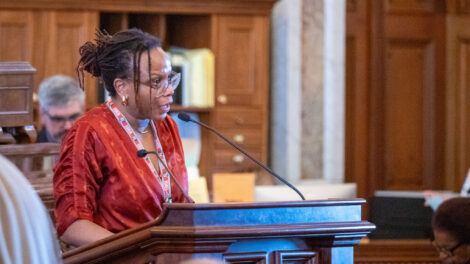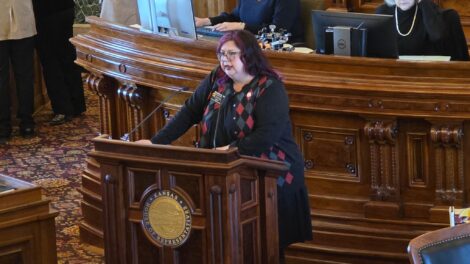New reports show Kansas’ health ranking is plummeting, rate of uninsured children is on the rise

photo by: Shutterstock photo
Kansas Statehouse in Topeka
Two recently released reports have some Kansas policymakers on edge about the health of Kansans and adamant that expanding Medicaid coverage will help.
One report showed that, since 1990, Kansas’ health ranking has fallen more than that of any other state. The other showed that, in a two-year period, the rate of uninsured Kansas children under the age of 6 has risen by one percentage point.
Since the first America’s Health Rankings Report, released in 1990, to this year’s, released on Dec. 5, Kansas has fallen from the 12th healthiest state in the U.S. to No. 29, experiencing the greatest rank decrease of all the states.
“This is indeed a call to action, and we must do more in order to fund the health care improvements that this state needs so badly,” Lee Norman, secretary of the Kansas Department of Health and Environment, said Thursday at the meeting of the Governor’s Council on Medicaid Expansion. Norman is a member of the council.
“I don’t think we want to put on the road signs that come into the state of Kansas ‘Welcome to the least healthy state of the union, we’re shooting for Mississippi!'” Norman said. Mississippi was ranked last on the annual health rankings.
Of the three states that have seen the greatest ranking decrease — Missouri, Wisconsin and Kansas — none has adopted Medicaid expansion. Of the four states that have seen the greatest ranking increase — New York, Vermont, Maryland and New Jersey — all have adopted Medicaid expansion.
“It is a very, very clear association with healthy outcomes with access to health care,” Norman said Thursday.
Currently, 36 states and Washington, D.C., have adopted Medicaid expansion. Medicaid expansion refers to a provision in the federal Affordable Care Act that allows states to expand Medicaid eligibility to uninsured people whose incomes are at or below 138% of the federal poverty level. Kansas lawmakers have so far resisted the expansion. In March 2017, then Gov. Sam Brownback vetoed a bill that would have expanded Medicaid, but lawmakers failed to override the veto.
The other report, released Monday by Georgetown University’s Center for Children and Families, shows that the rate of uninsured Kansas children under the age of 6 increased one percentage point, from 3.9% in 2016 to 4.9% in 2018.
Comparatively, in the United States as a whole, the rate of uninsured children under the age of 6 increased half a percentage point from 3.8% in 2016 to 4.3% in 2018.
“Lawmakers must ensure our state’s children can see the doctor when they get sick without creating devastating financial hardship,” Kansas Action for Children President John Wilson said in a news release about the findings.
According to the report, young children are more likely to be uninsured in states that have not expanded Medicaid to adults.
“Between 2016 and 2018, non-expansion states saw an increase in the rate of uninsured children under age 6 that was more than double the growth in expansion states,” the report states.
“Medicaid expansion supports parents’ health and makes it more likely their children will be covered,” Wilson said in the release.
Medicaid expansion would increase the number of eligible adults, not children. Children can receive insurance through Medicaid, the Children’s Health Insurance Program (CHIP) or private insurance.
But Kansas Action for Children believes that if more parents become eligible for Medicaid, the rate of uninsured children may decline due to outreach efforts and increased awareness of available services.
“Research shows that when adults have access to coverage, their children are more likely to be enrolled,” Emily Fetsch wrote in a recent blog post for KAC. “The latest example of this ‘welcome mat’ effect came in Virginia, where, since the state began Medicaid expansion enrollment for adults in January 2019, more than 25,000 children gained coverage through Medicaid and CHIP.”
According to the Kansas Health Institute, in 2018, 39,965 Kansas children were uninsured, and, of those, 27,464 are currently eligible for Medicaid or CHIP.
The Governor’s Council on Medicaid Expansion held its final meeting on Thursday. At the onset of the meeting, Gov. Laura Kelly asked that the council develop three to five guiding principles for Medicaid expansion in Kansas to share in a final report, due in January.




